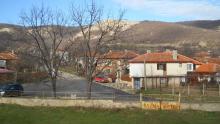Vladimir Zhobov

| disc | say 3pl pres I | people pl def | L.part neg exist | lord sg m | lord sg m | one sg n adj | time sg n | on | earth sg f def | walk sg m L.part I |
| nom 1sg | already adv | almost adj | hundred.year.old sg f adj | ninety | grandmother pl adj | 1sg pres aux clt | hear sg f L.part I |
| how interr | sg n L.part cop | on | earth sg f def | lord sg m | walk sg m L.part I |
| to | plowman pl m def | how interr | say sg m L.part P | comp | plow 3pl pres I | to | woman pl f def | how interr | say sg m L.part P | comp | weave 3pl pres I |
| but | now adj | change 3sg aor P | acc refl clt | people sg m def | neg | recognize 3sg pres P | lord sg m def |
| nom m 3sg | fut | precipitate 3sg pres P | again adv | fut neg | comp | remain 3sg pres P | thus adv | but | when inter.rel | pass 3sg pres P | time sg n |
| but | fut | dry out 3pl pres P | corn pl m def | disc |
| fut | dry out 3pl pres P |
| disc | nom 1sg | neg | neg | acc n 3sg clt | know 1sg pres I | sow 3pl pres I | interr clt |
| disc | thus adv | by | acc refl | dat refl clt | see 3sg pres P | dat 1sg clt | acc refl clt | that conj | 3pl pres aux clt | sow pl L.part I |
| nom 1sg | sow 1sg aor I | but | now adv | what sg n interr | fut | become 3sg pres P |
| disc | […] | corn pl m def | can pres imprs | comp | acc refl clt | keep 3pl pres I | but | other sg f adj | year sg f | drought sg f |
| and | again adv |
| pres exist |
| gather 3pl pres I |
| mean 3sg pres I | young pl def adj | neg | neg | know 3pl pres I | lord sg m | now adv | neg | go 3pl pres I | to | church sg f |
| disc | say 3pl pres I | neg | 3sg pres cop clt | lord sg m | blue sg f adj | slab sg f |
Text copyright © 2011-2016 Ronelle Alexander and Vladimir Zhobov. Texts and other parts of the website may be copied only for non-commercial, research, or educational purposes, provided the source of the material is cited accordingly. Cited material may not include the entire website or substantial portions thereof.
Comments and questions may be addressed to bdlt@berkeley.edu.
Recommended Model for Citations
Bulgarian Dialectology as Living Tradition [2016] (http://www.bulgariandialectology.org, visited on 1 March 2016)
Babjak 1: 13-15. In: Bulgarian Dialectology as Living Tradition [2016] (http://www.bulgariandialectology.org, visited on 1 March 2016)